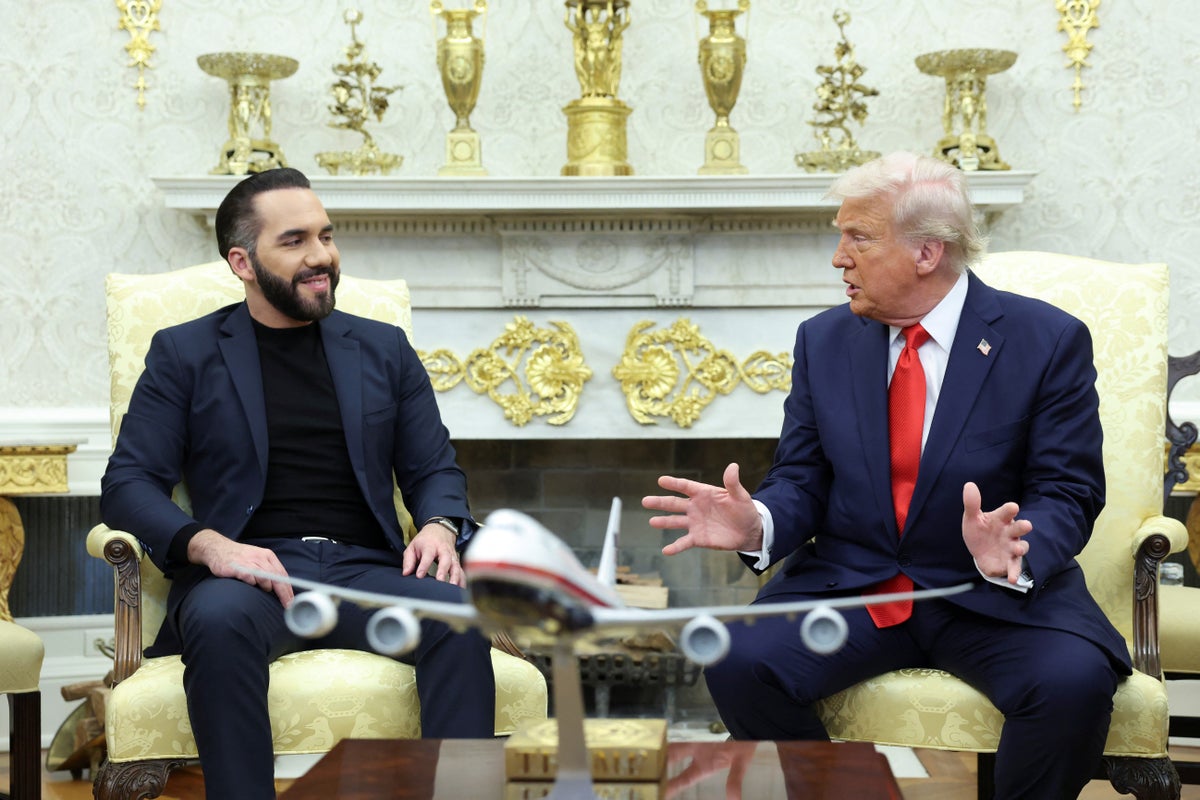The Trump administration is refusing to ask El Salvador’s president Nayib Bukele to release a Maryland man who was mistakenly deported to his country and incarcerated in a notorious prison — and Bukele isn’t interested in releasing him, either.
Bukele, who met with Trump in the Oval Office on Monday, was asked by a reporter if he’d consider releasing Kilmar Abrego Garcia, a Salvadoran citizen who was living in Maryland before he was arrested and deported back to his home country last month despite an immigration judge’s years-old order preventing the government from deporting him.
The government’s justification for deporting Abrego Garcia was a claim that he was a member of the Salvadoran gang MS-13 in New York — a place where he has never lived — and Bukele’s government has incarcerated him in the CECOT prison it built two years ago to house accused gang members.
Citing both his government’s and the Trump administration’s designation of MS-13 as terrorist organizations, Bukele offered a sarcastic reply to the reporter.
“Are you suggesting I smuggle a terrorist into the United States? How can I return him to the United States, like I smuggle him into the United States? Of course, I’m not going to do it,” he said.
Bukele added that the reporter’s question was “preposterous” and said he lacks the power to return him.
“We just turned the murder capital of the world to the safest country the western hemisphere. And you want us to go back into the releasing criminals, so we can go back to the the murder capital of the world, and that’s that’s not going to happen,” he said.
Last week, the Supreme Court ordered the administration to “facilitate” the release of Abrego Garcia, whose imprisonment in El Salvador was due to an admitted “administrative error.”
His removal to the country’s notorious prison was “illegal,” according to the high court.
But Trump administration officials have repeatedly asserted he is a member of MS-13, designated a foreign terrorist organization, and thus eligible for removal from the country despite the court order blocking his deportation.
Abrego Garcia was sent to El Salvador’s CECOT on March 15, joining dozens of mostly Venezuelan immigrants on removal flights after the president secretly invoked the Alien Enemies Act to summarily deport alleged Tren de Aragua gang members.
One of those planes allegedly carried immigrants with court orders for their removal, not under the president’s wartime authority. Abrego Garcia was on that plane — something administration officials have called an “oversight” — despite no orders for his removal from the country.
In 2019, a judge had granted him humanitarian protections from removal after credible testimony over fears of violence and death in his home country, which he fled in 2011.
Under that order, he is allowed to live and work in the United States legally, and must attend regular check-ins with Immigration and Customs Enforcement. His most recent appearance was in January, according to court documents, and his attorney has said Abrego Garcia has no criminal record in either the United States or El Salvador. Since then, he has been living in Maryland with his wife and 5-year-old child — both U.S. citizens — and helping raise two children from a previous relationship.
In a 22-page ruling earlier this month, Maryland District Judge Paula Xinis ripped the Trump administration for its “wholly lawless” decision and “grievous error” that “shocks the conscience.
“As defendants acknowledge, they had no legal authority to arrest him, no justification to detain him, and no grounds to send him to El Salvador — let alone deliver him into one of the most dangerous prisons in the Western Hemisphere,” Judge Xinis wrote.
Asked repeatedly during a Friday afternoon hearing for “basic” information about where Abrego Garcia is, and what the government is doing to get him back, Justice Department lawyers said they could not answer.Judge Xinis then ordered the administration to provide daily updates on his condition.
But in court filings, Justice Department attorneys have stressed that they interpret the Supreme Court’s order to say the judge can’t direct Trump — or anyone in his administration — to ask for Abrego Garcia’s return because courts “have no authority to direct the executive branch to conduct foreign relations in a particular way, or engage with a foreign sovereign in a given manner.”
In the Oval Office alongside Trump, Secretary of State Marco Rubio echoed that line of argument after Trump asked him to weigh in during the question-and-answer session with reporters.
“I don’t understand what the confusion is. This individual is a citizen of El Salvador. He was illegally in the United States and was returned to his country. That’s where you deport people back to their country of origin,” he said. “And I can tell you this … the foreign policy of the United States is conducted by the President of the United States, not by a court. And no court in the United States has a right to conduct the foreign policy of the United States.
A hearing in the case is schedule for Tuesday.
Kilmar Abrego Garcia, Abrego Garcia, El Salvador, Nayib Bukele, Trump administration, United States, administration officials, Oval Office, District Judge Paula Xinis, notorious prison
#Salvador #President #Nayib #Bukele #wont #commit #returning #man #mistakenly #deported #U.S
